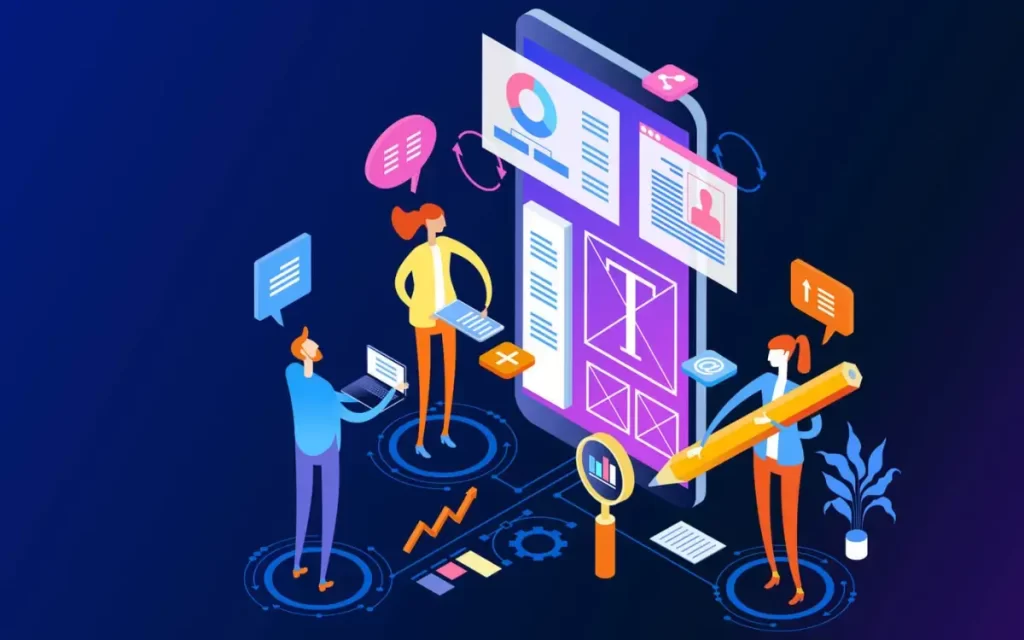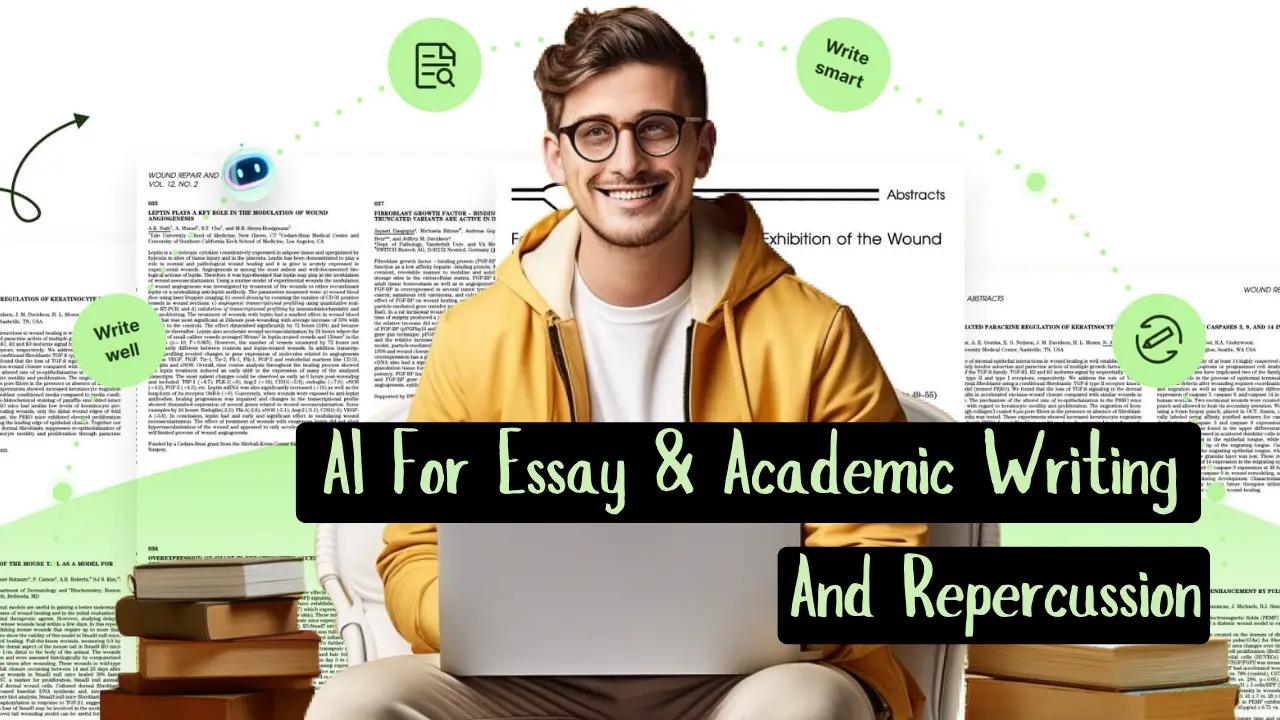Artificial intelligence (AI) has become a hot topic these days.
I’m sure you have been using some kind of AI writing tools, but at some point, you might have thought about the repercussions of using AI for essay and academic writing.
AI tools can be incredibly helpful, offering everything from grammar checks to full-paragraph suggestions, but they also come with their own set of challenges.
For students, it’s important to assess, how is AI influencing their writing and thinking skills?
There are two sides of the coin.
Replying too heavily on AI to get things done, has serious repercussions. In this article, I’ll be discussing that.
The use of AI in academic writing raises important questions about originality and academic integrity, we’ve discussed that as well as how you can resolve these issues.
Apart from that, I am also planning to write more articles and guides on how to use AI tools for writing essays as well as academic writing, have positive influence of AI on skills, how not to rely on AI, how to make AI essay undetectable, what AI essay writing tools to use and so on.
Make sure you stay tune with us.
Positive And Negative Repercussion Of Using AI For Essay & Academic Writing
While AI offers significant advantages in terms of improving writing quality, efficiency, and learning, it also poses challenges related to academic integrity, skill development, and ethical use.
Balancing these aspects is crucial for maximizing the benefits of AI in academic writing while minimizing its potential drawbacks.
The use of AI tools in student essay and academic writing has several significant repercussions, encompassing both benefits and challenges:
Positive Repercussion Of Using AI For Essay & Academic Writing
✅ Enhanced Writing Quality
✔️ Grammar and Style Improvement: AI tools can help college students improve their grammar, style, and overall writing quality by providing instant feedback and corrections.
✔️ Structure and Clarity: AI can offer suggestions for better structuring essays and making arguments clearer, aiding students in organizing their thoughts more effectively.
✅ Efficiency and Productivity
✔️ Time-Saving: AI can help students generate content faster, conduct research more efficiently, and even draft initial versions of essays, allowing more time for revision and refinement.
✔️ Research Assistance: AI can assist in finding relevant sources, summarizing articles, and even highlighting key points, making the research process quicker and more comprehensive.
✅ Learning and Skill Development
✔️ Personalized Feedback: AI can provide personalized feedback tailored to a student’s specific weaknesses, helping them improve their writing skills over time.
✔️ Access to Resources: AI tools can give students access to a vast range of resources and examples, enhancing their learning experience and understanding of various topics.
Negative Repercussion Of Using AI For Essay & Academic Writing
❌ Academic Integrity and Plagiarism
✔️ Plagiarism Concerns: There is a risk that students may use AI to produce work that they present as their own, raising serious issues about plagiarism and academic dishonesty.
✔️ Authenticity of Work: Over-reliance on AI-generated content can undermine the authenticity and originality of student work, as students may not fully engage in the writing process.
❌ Skill Degradation
✔️ Dependency: Excessive use of AI tools may lead to a dependency that hampers the development of critical writing and thinking skills, as students might rely on AI for tasks they should learn to perform themselves.
✔️ Reduced Critical Engagement: If students depend on AI to generate ideas and content, they may engage less critically with their subjects, diminishing their ability to think deeply and independently.
❌ Ethical and Educational Concerns
✔️ Fairness and Equity: Access to advanced AI tools may not be equally available to all students, potentially exacerbating existing inequalities in education.
✔️ Misuse of Technology: There is a potential for misuse, where students might use AI to bypass learning processes, thus defeating the purpose of education.
❌ Quality Control and Bias
✔️ Quality of AI Output: AI-generated content may not always be accurate or of high quality. There can be instances of incorrect information or poorly constructed arguments that students might not be able to identify and correct.
✔️ Bias in AI: AI systems can perpetuate and even amplify existing biases present in the training data, leading to biased or skewed content that could misinform students.
How To Mitigating Negative Repercussions When Using AI for Essay Writing & Academic Writing?

Education and Awareness: Teaching students about the ethical use of AI and the importance of academic integrity can help mitigate issues related to plagiarism and over-reliance on AI tools.
Balanced Integration: Encouraging a balanced use of AI, where it complements rather than replaces human effort, can help students benefit from AI without losing essential skills.
Monitoring and Regulation: Institutions can implement policies and monitoring systems to detect and prevent misuse of AI, ensuring that academic standards are maintained.
Plagiarism and Originality When Using AI For Essay Or Academic Writing
How AI can create unoriginal content and get students flagged for plagiarism. Discuss strategies for proper citation and maintaining a distinct voice.
AI-generated content can create issues of unoriginality and lead to students being flagged for plagiarism.
While AI tools can generate text that seems coherent and relevant, they often do so by drawing upon existing content in ways that can inadvertently replicate phrasing or ideas without proper attribution.
Strategies for Proper Citation
- Understand Citation Styles: Familiarize yourself with the required citation style (APA, MLA, Chicago, etc.) and use it consistently.
- Use Citation Tools: Utilize citation generators and management tools like Zotero or EndNote to keep track of sources.
- Acknowledge AI Contributions: If using AI-generated content, be transparent about its use and cite it appropriately. Some academic institutions may require specific formats for citing AI tools.
- Paraphrase and Summarize: Instead of copying AI-generated text verbatim, paraphrase and summarize it, adding your own insights and voice.
Maintaining a Distinct Voice
- Engage with the Material: Deeply engage with your research material and reflect on it critically. This helps in developing your own perspectives.
- Draft Independently: Start by drafting your thoughts and arguments independently before refining them with the help of AI tools.
- Personal Insights: Infuse personal insights and experiences related to the topic, which AI cannot replicate.
Over-Reliance And Critical Thinking
How depending on AI for ideas and structure can hinder a student’s ability to develop critical thinking and research skills.
Depending heavily on AI for generating ideas and structuring essays can undermine the development of critical thinking and research skills.
Strategies to Enhance Critical Thinking
- Active Reading: Engage in active reading strategies like annotating texts and questioning the material.
- Independent Research: Conduct independent research to gather diverse perspectives and synthesize them into your own argument.
- Critical Analysis: Analyze the information critically by evaluating the evidence, questioning assumptions, and considering alternative viewpoints.
Balancing AI Use
- Supplement, Don’t Substitute: For content creation, use AI tools as a supplementary tool rather than a primary source of content creation.
- Reflect on AI Suggestions: Critically assess the suggestions and content provided by AI to ensure they align with your understanding and objectives.
- Practice Writing: Regularly practice writing and structuring essays without AI assistance to build and maintain your skills.
👉🏼 10 Best AI Tools for Ecommerce Marketing
Shallow Understanding and Source Evaluation

How AI-generated content might lack depth and how students should still prioritize evaluating sources themselves.
AI-generated content can often lack depth, as AI tools might not fully understand the nuances of the topic or provide a comprehensive analysis.
Strategies for Deep Understanding
- In-depth Study: Invest time in studying your subject deeply through a variety of sources, including academic journals, books, and reputable online resources.
- Source Evaluation: Develop skills to evaluate sources critically, considering the author’s credentials, the publication’s reputation, and the quality of the evidence provided.
- Cross-referencing: Cross-reference AI-generated content with multiple sources to ensure accuracy and depth.
Developing Source Evaluation Skills
- Learn Evaluation Criteria: Understand criteria for evaluating sources, such as authority, accuracy, currency, relevance, and objectivity.
- Practice Source Critique: Regularly practice critiquing sources in assignments and discussions to build these skills.
- Use Libraries and Databases: Utilize academic libraries and databases to access high-quality, peer-reviewed materials.
Unethical Use and Academic Integrity
Addressing the concerns around using AI to entirely fabricate essays or bypass learning objectives.
Using AI to fabricate essays or bypass learning objectives raises significant ethical concerns and compromises academic integrity.
Strategies to Uphold Academic Integrity
- Understand Academic Policies: Be aware of your institution’s academic integrity policies and the consequences of unethical behavior.
- Commit to Original Work: Commit to producing original work that reflects your own understanding and effort.
- Seek Help Appropriately: If struggling with an assignment, seek help from instructors, tutors, or academic support services instead of resorting to unethical practices.
Promoting the Ethical Use of AI
- Set Clear Boundaries: Clearly define how and when AI tools can be used in your work.
- Education and Training: Engage in training and education on ethical AI use, understanding both its capabilities and limitations.
- Model Integrity: Instructors and institutions should model and promote academic integrity through their own practices and policies.
By being mindful of these aspects, students can effectively use AI tools to enhance their learning while maintaining originality, critical thinking, and academic integrity.
Intellectual Property Issues And How To Resolve Them With AI

AI-generated content can raise significant intellectual property (IP) concerns, including questions of ownership, originality, and potential infringement. These issues are critical in academia, business, and creative industries, where the proper handling of IP is essential for maintaining legal and ethical standards.
Who Owns AI-Generated Content?
- Creator of the AI: Some argue that the developers of the AI software should hold ownership, as they created the tool.
- User of the AI: Others believe that the user who inputs the data and prompts the AI should own the resulting content.
- No Clear Ownership: In some jurisdictions, there may be no clear ownership for AI-generated content, creating legal ambiguities.
How To Resolve These Issues?
- Clear Agreements: Establish clear agreements between developers and users regarding ownership rights and usage terms.
- Policy Development: Institutions and companies should develop policies that specify ownership and IP rights for AI-generated content.
- Legal Frameworks: Advocate for the development of legal frameworks that address ownership and IP issues related to AI.
Originality and Copyright Infringement
AI-generated content often combines and repurposes existing data, which can lead to unintentional replication of copyrighted material, raising concerns about originality and potential copyright infringement.
How To Resolve These Issues?
- Use Licensed Data: Ensure that the data fed into AI tools is properly licensed or in the public domain to avoid infringing on existing copyrights.
- Regular Audits: Perform regular audits of AI outputs to check for potential infringements.
- Plagiarism Detection Tools: Utilize advanced plagiarism detection tools to verify the originality of AI-generated content.
Licensing AI-Generated Content
AI-generated content can be subject to various licensing models, which determine how the content can be used, shared, and modified.
How To Resolve These Issues?
- Open Licensing: Consider using open licensing models like Creative Commons to clarify usage rights while promoting sharing and collaboration.
- Custom Licenses: Develop custom licenses tailored to specific use cases and ensure users understand their rights and obligations.
- Educate Users: Provide education and resources on licensing options and their implications for AI-generated content.
Protecting AI Models and Data
The data used to train AI models, as well as the models themselves, can be valuable intellectual property that requires protection against unauthorized use and distribution.
How To Resolve These Issues?
- Data Security: Implement robust data security measures to protect the datasets used for training AI models.
- Model Protection: Use techniques like watermarking and encryption to protect AI models from unauthorized use and distribution.
- Non-Disclosure Agreements: Require non-disclosure agreements (NDAs) for individuals who have access to proprietary AI models and data.
Ethical and Legal Compliance
Ensuring Ethical Use: Ensuring that AI tools and the content they generate are used ethically and in compliance with legal standards is essential for maintaining trust and integrity.
How To Resolve These Issues?
- Ethical Guidelines: Develop and enforce ethical guidelines for the use of AI in content creation.
- Legal Compliance: Stay informed about legal developments related to AI and intellectual property and ensure compliance with relevant laws and regulations.
- Transparency: Promote transparency in how AI tools are used and the sources of data they rely on.
What Are The Challenges When Using AI For Essay And Academic Writing?
Using AI for essay and academic writing introduces several challenges that need to be carefully managed to ensure academic integrity, quality of work, and the development of essential skills in students.
1. Ensuring Originality and Avoiding Plagiarism
- Unintentional Plagiarism: AI tools often draw from existing content, which can lead to unintentional plagiarism if the AI-generated text closely mirrors the sources.
- Detection Issues: Advanced AI-generated content can sometimes evade traditional plagiarism detection tools, making it difficult to ensure originality.
2. Developing Critical Thinking Skills
- Over-Reliance: Students may become overly reliant on AI for idea generation and structure, which can impede the development of critical thinking and independent analytical skills.
- Superficial Understanding: AI-generated content may provide a superficial understanding of the topic, lacking the depth and critical analysis that human research and thought provide.
3. Maintaining Academic Integrity
- Ethical Concerns: Using AI to generate essays can be seen as an unethical shortcut, bypassing the learning process and undermining academic integrity.
- Policy Compliance: There may be ambiguity around the acceptable use of AI in academic work, leading to potential breaches of institutional policies.
4. Quality and Coherence of AI-Generated Content
- Lack of Depth: AI may produce content that lacks depth, nuanced argumentation, and critical engagement with the topic.
- Incoherence and Errors: While AI can generate coherent text, it can also produce content that is logically inconsistent, factually incorrect, or stylistically poor.
5. Authenticity and Personal Voice
- Loss of Personal Voice: Over-reliance on AI can result in a loss of the student’s personal voice and unique perspective in their writing.
- Homogenization: AI-generated content can lead to homogenization, where essays lack individuality and original insight.
6. Evaluation and Source Verification
- Source Quality: AI tools might not always differentiate between high-quality and low-quality sources, leading to the inclusion of unreliable information.
- Verification Challenges: Students may neglect the critical evaluation of sources, relying on AI-generated suggestions without proper verification.
7. Intellectual Property Issues
- Ownership and Attribution: There can be ambiguity regarding the ownership of AI-generated content and how to properly attribute the use of AI tools in academic work.
- Copyright Infringement: AI-generated content can inadvertently replicate copyrighted material, raising legal concerns.
Strategies to Address These Challenges
By implementing these strategies, educators can mitigate the challenges associated with using AI for essay and academic writing, ensuring that students develop essential skills, maintain academic integrity, and produce high-quality, original work.
1. Educate on Proper Use:
- Training and Workshops: Conduct training sessions on the ethical use of AI tools and the importance of maintaining academic integrity.
- Clear Guidelines: Establish clear guidelines on how AI tools can be used in academic work, including citation practices.
2. Emphasize Critical Thinking:
- Independent Research: Encourage students to conduct independent research and you may use AI as a supplementary tool rather than the primary source of content.
- Critical Engagement: Promote activities that require critical engagement with AI-generated content, such as analysing and critiquing the output.
3. Enhance Assignment Design:
- Unique Prompts: Create unique and specific assignment prompts that require personalized responses and original thought.
- Process Documentation: Require students to document their research and writing process, demonstrating their independent work.
4. Utilize Technology for Verification:
- Advanced Detection Tools: Use advanced plagiarism detection tools capable of identifying AI-generated content.
- Source Verification: Implement tools and practices that help verify the quality and reliability of sources used in AI-generated content.
5. Foster Personal Voice and Creativity:
- Reflective Writing: Incorporate reflective writing assignments that encourage students to express their own ideas and experiences.
- Diverse Assessments: Use a variety of assessment methods to capture different dimensions of student learning and creativity.
6. Address Intellectual Property Concerns:
- Clear Attribution Practices: Develop and teach clear practices for attributing the use of AI tools in academic work.
- Legal Awareness: Educate students on intellectual property laws and the importance of respecting copyrights.
FAQs Related To Use Of AI By Students For Writing Essay & Academic Writing
Can I use AI tools to help with my essay writing?
Yes, AI tools can be used to assist with essay writing by generating ideas, providing structure, and suggesting content. However, it’s crucial to use these tools ethically and ensure that the final work is your own.
Is it considered plagiarism if I use AI to write my essay?
If you use AI-generated content without proper attribution or pass it off as entirely your own work, it can be considered plagiarism. Always check your institution’s policies and cite any AI-generated content appropriately.
How can I ensure my work remains original when using AI?
To maintain originality, use AI as a supplementary tool rather than the main source. Paraphrase AI-generated suggestions, add your own insights, and properly cite any AI contributions.
What are the risks of relying too much on AI for writing?
Over-reliance on AI can hinder your development of critical thinking and writing skills, lead to superficial understanding of the topic, and result in potential academic integrity issues.
How do I cite AI-generated content in my essays?
Follow the specific guidelines provided by your institution or use general citation practices. For example, you might include a statement like “This section was generated with the assistance of OpenAI’s GPT-4.”
Can AI-generated content be detected by plagiarism detection tools?
Some advanced plagiarism detection tools can identify AI-generated content. However, these tools are constantly evolving, and not all AI content may be flagged.
What are the ethical considerations when using AI for academic writing?
Ethical considerations include ensuring originality, avoiding plagiarism, attributing AI contributions correctly, and using AI as a tool to enhance your learning rather than bypassing the educational process.
How can I use AI tools responsibly in my academic work?
Use AI tools to generate ideas, improve grammar, and structure your essays, but always critically evaluate the content, add your own analysis, and properly cite any AI assistance.
What should I do if I am unsure about using AI for an assignment?
Consult your instructor or academic advisor for guidance on the acceptable use of AI tools in your assignments to ensure compliance with your institution’s policies.
What are the potential repercussions of using AI unethically in academic writing?
Unethical use of AI can lead to accusations of plagiarism, academic penalties, loss of credibility, and damage to your academic and professional reputation. Always strive to maintain integrity and transparency in your work.
Conclusion
Using AI tools for essay, literature and academic writing presents both opportunities and challenges.
On one hand, AI can assist students by generating ideas, enhancing writing quality, and providing structural suggestions.
On the other hand, it raises significant concerns about originality, academic integrity, and the development of essential skills.
Artificial Intelligence for writing essay, academic writing or any kind of paper, can be a smart ways to enhance skills, but one need to put effort in learning how.
If not, then overtime you’ll notice negative repercussion in a process of learning and enhancing skills, ability and critical thinking.
By leveraging AI responsibly and ethically, students can benefit from these advanced tools while preserving the core values of academic integrity and originality.
Educators play a crucial role in guiding students through this process, ensuring that AI enhances rather than undermines the educational experience.
Ultimately, the goal is to prepare students for future challenges with robust critical thinking,
We’ll be covering more articles to create in-depth knowledge in the subject. You may bookmark our page/websites, if interested to hear back when we throw our next articles.
Drop you comment in the comment section below, would love to see your response and thoughts.
